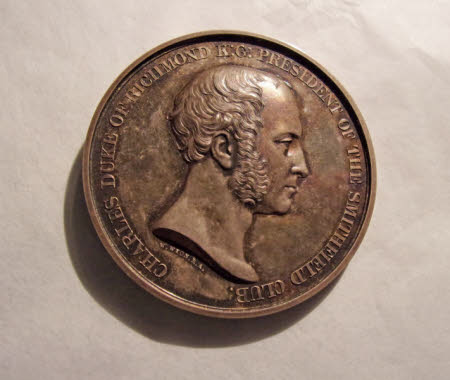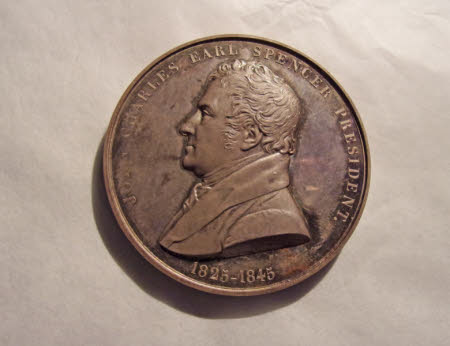Lord Bristol's Smithfield Club Prize Medal for 1885
William Wyon (1795 - 1851)
Category
Coins and medals
Date
c. 1885
Materials
Silver
Measurements
4 mm (Height); 47 mm (Diameter)
Place of origin
London
Order this imageCollection
Ickworth, Suffolk
NT 849222.2
Summary
Sculpture, silver; Lord Bristol’s Smithfield Club Prize Medal for 1885, by William Wyon (1795-1851); London, c. 1850-51, this cast c. 1883. An example in silver of the Smithfield Club Prize Medal, by William Wyon (1795-1851), awarded for improvements in the breeding of cattle. The obverse has a bust portrait facing left of John Charles Spencer, Viscount Althorp and Third Earl Spencer (1782-1845), President of the Smithfield Club, whilst on the reverse is a bust portrait facing right of Charles Gordon Lennox, fifth Duke of Richmond (1791-1860), Vice-President of the Club until 1845, when he succeeded Earl Spencer as President. Founded in 1802, the Smithfield Club, still in existence today as the Royal Smithfield Club, was established to encourage and promote improvements in the breeding of domestic livestock, in particular cattle, sheep, horses and pigs. This is one of several Smithfield Club medals awarded to Frederick William Hervey, 3rd Marquess of Bristol (1834-1907), who was an enthusiastic breeder of Suffolk sheep on his estate and was an exhibitor at many shows during the 1880s.
Full description
A silver example of the Smithfield Club medal. The obverse with a draped bust of Earl Spencer, in contemporary dress and in profile, facing left. The legend: JOHN CHARLES EARL SPENCER. 1825-1845 and, below the truncation of the bust, the artist's signature: W. WYON, R.A. The reverse is the bust of the Duke of Richmond, facing right and bare-shouldered. The legend: CHARLES DUKE OF RICHMOND K: G: PRESIDENT OF THE SMITHFIELD CLUB and, below the truncation of the bust, the artist's signature: W. WYON, R.A. The medal has an engraved inscription on its edge referring to the Earl of Bristol's prize for the 1885 show.
Provenance
Awarded to Frederick William Hervey, 3rd Marquess of Bristol (1834-1907) and by descent, as part of the Bristol Collection. Acquired by the National Trust in 1956 under the auspices of the National Land Fund, later the National Heritage Memorial Fund
Marks and inscriptions
Obverse, legend, and signature, below truncation: : JOHN CHARLES EARL SPENCER. 1825-1845. W. WYON, R.A. Reverse, legend, and signature, below truncation: : CHARLES DUKE OF RICHMOND K: G: PRESIDENT OF THE SMITHFIELD CLUB. W. WYON. R.A. Engraved on edge:: MARQUESS OF BRISTOL, ICKWORTH PARK. BURY ST. EDMUNDS / AS BREEDER BEST PEN OF SHEEP IN CLASS LVI. 1885
Makers and roles
William Wyon (1795 - 1851), medallist
References
Brown 1987: Laurence Brown, British Historical Medals 1837-1901. The Reign of Queen Victoria, London 1987, p. 110, no. 2218. Eimer 2010: Christopher Eimer, British Commemorative Medals and their Values, London 2010, p. 190, no. 1400, Pl. 153. Jones 2025: Mark Jones, William Wyon, London 2025, pp. 637-38, no. 213.

